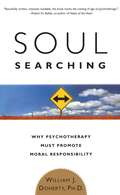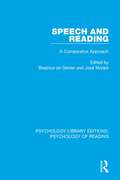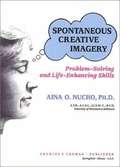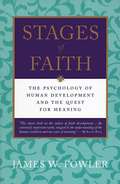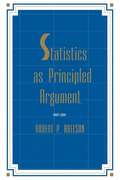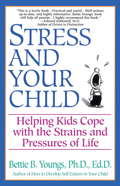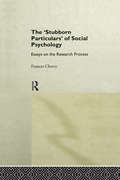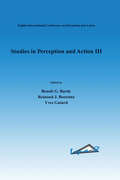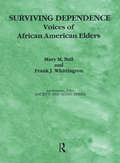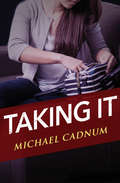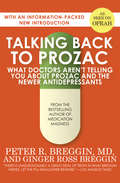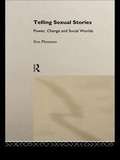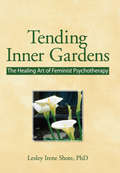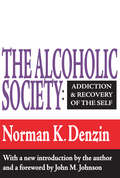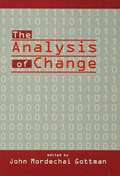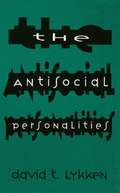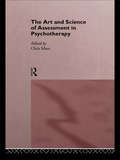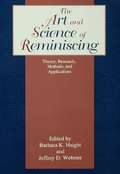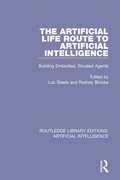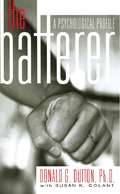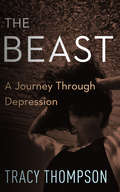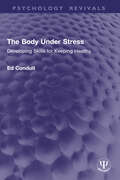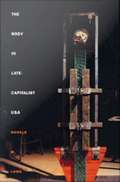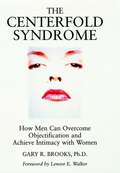- Table View
- List View
Soul Searching: Why Psychotherapy Must Promote Moral Responsibility
by William J. DohertyPaul, a divorced father, wants to back out of his child care arrangement and spend less time with his children. Nathan has been lying to his wife about a serious medical condition. Marsha, recently separated from her husband, cannot resist telling her children negative things about their father. What is the role of therapy in these situations? Trained to strive for neutrality and to focus strictly on the clients’ needs, most therapists generally consider moral issues such as fairness, truthfulness, and obligation beyond their domain. Now, an award-winning psychologist and family therapist criticizes psychotherapy’s overemphasis on individual self-interest and calls for a sense of moral responsibility in therapy.
Speech and Reading: A Comparative Approach (Psychology Library Editions: Psychology of Reading #2)
by Beatrice De Gelder José MoraisOriginally published in 1995, this collection of papers introduced a new dimension to the understanding of reading by focusing on the relation between spoken and written language processing. New perspectives on speech and reading are introduced by highlighting aspects of the two linguistic skills that had received little attention in the past. The comparative perspective adopted in this collection presents an innovative focus on speech and the acquisition of alphabetic reading skill. Major new sources of evidence are discussed, like reading in nonconventional input modalities, braille reading, and speech processing in lip-reading. Contributors also discuss the reading process in non-alphabetic orthographies and the specifics of the reading acquisition problem in logographic or mixed writing systems (like Chinese and Japanese) and their relations to underlying speech representations. A central concern of all chapters is the role of phonological processes in different modalities and writings systems, and at different stages in the reading acquisition process. Drawing on expertise of the contributors, the book presents a novel and varied view of the achievements, the promises and the challenges facing the researcher once the intimate link between speech and reading comes to the foreground.
Spontaneous Creative Imagery: Problem-Solving and Life-Enhancing Skills
by Martin L. Rossman Aina O. NuchoImagery allows us to see where we've been, and remember formative patterns of not only distress but creative coping and strengths. Imagery also allows us to look into the future, not as fortune tellers, but as creative beings exploring possible alternatives. It allows us to take our inner bearings and to set our sights on where we want to go. With this landmark book, Dr. Aina Nucho brings this powerful navigational tool clearly to light as the multifaceted health resource it can be.
Stages of Faith: The Psychology of Human Development and the Quest For Meaning
by James W. FowlerFaith, as approached here, is not necessarily religious, nor is it to be equated with belief. Rather, faith is a person's way of leaning into and making sense of life. More verb that noun, faith is the dynamic system of images, values, and commitments that guide one's life. It is thus universal: everyone who chooses to go on living operated by some basic faith. Building on the contributions of such key thinkers as Piaget, Erikson, and Kohlberg, Fowler draws on a wide range of scholarship, literature, and firsthand research to present expertly and engagingly the six stages that emerge in working out the meaning of our lives--from the intuitive, imitative faith of childhood through conventional and then more independent faith to the universalizing, self-transcending faith of full maturity. Stages of Faith helps us to understand our own pilgrimage of faith, the passages of our own quest for meaning and value.
Statistics As Principled Argument
by Robert P. AbelsonIn this illuminating volume, Robert P. Abelson delves into the too-often dismissed problems of interpreting quantitative data and then presenting them in the context of a coherent story about one's research. Unlike too many books on statistics, this is a remarkably engaging read, filled with fascinating real-life (and real-research) examples rather than with recipes for analysis. It will be of true interest and lasting value to beginning graduate students and seasoned researchers alike. The focus of the book is that the purpose of statistics is to organize a useful argument from quantitative evidence, using a form of principled rhetoric. Five criteria, described by the acronym MAGIC (magnitude, articulation, generality, interestingness, and credibility) are proposed as crucial features of a persuasive, principled argument. Particular statistical methods are discussed, with minimum use of formulas and heavy data sets. The ideas throughout the book revolve around elementary probability theory, t tests, and simple issues of research design. It is therefore assumed that the reader has already had some access to elementary statistics. Many examples are included to explain the connection of statistics to substantive claims about real phenomena.
Stress and Your Child
by Betty YoungsGive your children back their childhood. We like to think of childhood as a carefree, relaxed time of life, but the truth is, children today experience more stress than ever before: parents' fast-paced lifestyles, the frequent breakup of families, urban crime, schools in turmoil, and a host of other problems. However, according to Bettie B. Youngs, Ph.D., Ed.D, one of America's most admired experts on child psychology, children by mastering skills of coping and self-awareness--can actually draw vitality from stress and channel it to promote health, fitness, and self-esteem.Stress and Your Child helps parents understand the pressures that their children face and explores the essential ways to reduce, manage, and prevent stress from birth to age twenty. Dr. Youngs leads parents through each stage of their child's emotional and social development and teaches them: How to recognize the physical and emotional signs of stress in children- How to understand school-related stress, including social pressures, personal safety, and test-taking- How parental stress affects children- and what parents can do to alleviate it- How teaching kids self-esteem and emotional honesty can help them cope wth stress- How diet, physical activity, and realistic schedules can help to minimize stress in children. Stress and Your Child is an invaluable parenting guide. No family can afford to be without it!
Stubborn Particulars of Social Psychology: Essays on the Research Process (Critical Psychology Series)
by Frances CherryThe `Stubborn Particulars' of Social Psychology gives students an alternative approach to social psychology which acknowledges the limits of shared understandings often imposed by class, race, culture, nationality, ethnicity, language and gender. Frances Cherry shows how the generation of hypotheses, experimental practice, the interpretation of results and the process of scientific communication itself are equally framed by historical and cutural context. She discusses how to begin to understand one's own biases and prejudices, and how we create and make sense of our own social psychology as an engaged social critic, rather than as some idealised `objective' scientist. The `Stubborn Particulars' of Social Psychology should be required reading for all social psychology students as an antidote to their course text.
Studies in Perception and Action III (Studies in Perception and Action)
by Benoît G. Bardy Reinoud J. Bootsma Yves GuiardThis volume, a posterbook based on the seventh biennial Conference of the International Society for Ecological Psychology, is a collection of compact empirical and/or theoretical articles on the study of perception and action.
Surviving Dependence: Voices of African American Elders (Society and Aging Series)
by Mary M Ball Frank J WhittingtonTo date there has not been a clear look at the home care experience of older African Americans. "Surviving Dependence: Voices of African American Elders" attempts to meet the need for recording and interpreting the ordinary life of elderly African Americans on their own terms, in their own surroundings, and in so far as possible, in their own words. Ball and Whittington's research is unique in two ways: it focuses on older people who are African American and poor, and it describes the viewpoint of care recipients and their relationships with the public programs designed to help them. This book provides an in-depth view of the experiences of these seven frail elders as both care receivers and as active participants in their own care. The two primary themes the significant disabilities that often accompany old age and the tenacious will and ability to cope possessed by our informants are reflected in the title: "Surviving Dependence."
Taking It
by Michael CadnumA make-believe shoplifter is shocked to find herself actually stealing Anna loves everything about department stores: the smell, the clothes, the crowds. But her favorite things to watch are the detectives. She can spot a store detective a mile away, whether dressed as a tourist or pretending to be a cashier, and she knows just how to fool them: She lingers over an expensive sweater until she catches the detective's eye. When she leaves the store, they stop her, expecting to find the sweater hidden in her purse. But she's fooled them. Anna pretends to be a shoplifter, but she has never stolen anything at all. Until the day the scarf appears out of nowhere. She doesn't remember stealing it, and yet, there it is. As more and more stolen objects begin to appear, Anna worries that her little game is about to push her over the brink.
Talking Back to Prozac: What Doctors Aren't Telling You About Prozac and the Newer Antidepressants
by Peter R. Breggin Ginger Ross BregginA psychiatrist takes a critical look at this SSRI and newer medications that are among the most frequently prescribed drugs in America. Prozac. Millions of Americans are on it. And just about everyone else is wondering if they should be on it, too. The claims of the pro‑Prozac chorus are enticing: that it can cure everything from depression (the only disorder for which Prozac was originally approved) to fear of public speaking, PMS, obesity, shyness, migraine, and back pain—with few or no side effects. But is the reality quite different? At what price do we buy Prozac‑induced euphoria and a shiny new personality? Psychiatrist Peter Breggin, MD, and coauthor Ginger Ross Breggin answer these and other crucial questions in Talking Back to Prozac. They explain what Prozac is and how it works, and they take a hard look at the real story behind today&’s most controversial drug: The fact that Prozac was tested in trials of four to six weeks in length before receiving FDA approvalThe difficulty Prozac&’s manufacturer had in proving its effectiveness during these testsThe information on side effects that the FDA failed to include in its final labeling requirementsHow Prozac acts as a stimulant not unlike the addictive drugs cocaine and amphetamineThe dangers of possible Prozac addiction and abuseThe seriousness and frequency of Prozac&’s side effects, including agitation, insomnia, nausea, diarrhea, loss of libido, and difficulty reaching orgasmThe growing evidence that Prozac can cause violence and suicideThe social and workplace implications of using the drug not to cure depression but to change personality and enhance performance Using dramatic case histories as well as scientific research and carefully documented evidence, the Breggins expose the potentially damaging effects of Prozac. They also describe the resounding success that has been achieved with more humane alternatives for the treatment of depression.Talking Back to Prozac provides essential information for anyone who takes Prozac or is considering taking it, and for those who prescribe it.
Telling Sexual Stories: Power, Change, And Social Worlds
by Ken PlummerThis book explores the rites of a sexual story-telling culture. Taking three major examples - rape stories, coming-out stories, recovery stories - it examines the nature of these newly emerging narratives and the socio-historical conditions which have given rise to them. It looks at the rise of the women's movement, the lesbian and gay movement and the 'recovery' movement as harbingers of significant social change that encourage the telling of new stories.
Ten Thousand Dreams Interpreted or What's in a Dream
by Gustavus Hindman Millerinterpretation of 10,000 dreams
Tending Inner Gardens: The Healing Art of Feminist Psychotherapy
by Lesley I ShoreTending Inner Gardens: The Healing Art of Feminist Psychotherapy transforms the theory and practice of psychotherapy, one that values both the feminine and masculine perspectives. Set within a naturalistic framework, this model utilizes nature’s growing and healing processes. It proposes nature’s seasonal cycles as a model for the psychotherapy process, and author Lesley Irene Shore introduces nature’s seasonal cycle as a model for successful psychotherapy and demonstrates how to tune techniques to the rhythms of each season.Dr. Shore speaks with the voice of an experienced psychotherapist, sharing her struggles with therapeutic dilemmas and addressing issues common to every practitioner. She refuses to present simple solutions to the difficult process of helping people grow, yet offers new ways of thinking about this work. Readers will find this a healing book--for themselves as well as for their clients.The book covers relationship issues as well as the use of language, hypnosis, dreams, and creativity. Specific areas readers learn about include: language--teaches therapists to differentiate between questions that address conscious regions of the mind and ones which communicate with less conscious processes. metaphor--describes ways of working with metaphors to access less conscious processes trauma--explores the effects of psychological trauma and offers tools for healing its wounds psychotherapy process--uses nature’s seasonal cycle to chart the process of psychotherapyTending Inner Gardens transcends the artificial dichotomies currently characterizing much psychological thought. Psychotherapists will be interested in the natural model of psychotherapy which integrates a wide range of ideas and theories, especially the sections on the psychotherapy relationship, dreams, creativity, working with metaphors, language, and the process of psychotherapy. Interesting case studies illuminate this material. Students can benefit from seeing how the tools of psychotherapy are integrated with the art. Laypeople will enjoy reading about Dr. Shore’s personal evolution as a therapist, her life on Harmony Farm, and her cases, which are discussed in detail.While this book is primarily geared toward a professional audience, it attracts a wide range of readers. It should be read by experienced psychotherapists, faculty members, and practitioners, as well as those in training. This would generally include psychiatrists, psychologists, social workers, counselors, psychiatric nurses, and related professions. And while the book presents a primarily verbal, psychodynamic approach toward healing, its theoretical conceptualization will appeal to professionals in healing traditions such as art therapy, massage therapy, and expressive therapy.
The Alcoholic Society: Addiction and Recovery of the Self
by Reece McGeeOffering a unique theoretical foundation to understanding the lived experience of the active alcoholic, Denzin asserts that alcoholism is a disease in which negative emotions divide the self into warring, inner factions, fueled and distorted by alcoholic intoxication. The work is solidly anchored in a long-term study of the socialization experiences that began in alcoholism treatment centers and continue in Alcoholics Anonymous recovery programs. It covers the treatment process, the restructuring of self, the alcoholic's interaction with his recovery treatment program, and the modalities of self-transcendence that result from treatment.
The Analysis of Change
by John Mordechai GottmanContinuity and change have been major concerns of the social and behavioral sciences -- in the study of human development and in the study of processes that unfold in various ways across time. There has been a veritable explosion of techniques for studying change over time which have fundamentally changed how we need to think of and study change. Unfortunately, many of the old precepts and beliefs are still among us. The field of methodology for the study of change is itself ready to change. Recently, there have been many analytic and conceptual developments questioning our cherished beliefs about the study of change. As such, how are individuals to think about issues and correctly analyze change? The chapters in this volume address these issues. Divided into two sections, this book deals with designs that analyze change in multiple subjects, and with change in single subjects and an interacting system. Papers presented in this volume are accessible to scientists who are not methodologists. The character of the papers are more like primers than basic treatises on methodology, written for other methodologists. It is time that people stop thinking in rigid ways about how to study change and be introduced to a range of many possibilities. Change, stability, order and chaos are elusive concepts. The pursuit of the laws of change must be approached in as flexible and creative a fashion as possible. This book should help to lead the way.
The Antisocial Personalities
by David T. LykkenThis volume presents a scholarly analysis of psychopathic and sociopathic personalities and the conditions that give rise to them. In so doing, it offers a coherent theoretical and developmental analysis of socialization and its vicissitudes, and of the role played in socialization by the crime-relevant genetic traits of the child and the skills and limitations of the primary socializing agents, the parents. This volume also describes how American psychiatry's (DSM-IV) category of "Antisocial Personality Disorder" is heterogeneous and fails to document some of the more interesting and notorious psychopaths of our era. The author also shows why the antinomic formula "Nature vs. Nurture" should be revised to "Nature via Nurture" and reviews the evidence for the heritability of crime-relevant traits. One of these traits -- fearlessness -- seems to be one basis for the primary psychopathy and the author argues that the primary psychopath and the hero may be twigs on the same genetic branch. But crime -- the failure of socialization -- is rare among traditional peoples still living in the extended-family environment in which our common ancestors lived and to which our species is evolutionarily adapted. The author demonstrates that the sharp rise in crime and violence in the United States since the 1960s can be attributed to the coeval increase in divorce and illegitimacy which has left millions of fatherless children to be reared by over-burdened, often immature or sociopathic single mothers. The genus sociopathic personality includes those persons whose failure of socialization can be attributed largely to incompetent or indifferent rearing. Two generalizations supported by modern behavior genetic research are that most psychological traits have strong genetic roots and show little lasting influence of the rearing environment. This book demonstrates that the important trait of socialization is an exception. Although traits that obstruct or facilitate socialization tend to obey these rules, socialization itself is only weakly heritable; this is because modern American society displays such enormous variance in the relevant environmental factors, mainly in parental competence. Moreover, parental incompetence that produces sociopathy in one child is likely to have the same result with any siblings. This book argues that sociopathy contributes far more to crime and violence than psychopathy because sociopaths are much more numerous and because sociopathy is a familial trait for both genetic and environmental reasons. With a provocative thesis and an engaging style, this book will be of principal interest to clinical, personality, forensic, and developmental psychologists and their students, as well as to psychiatrists and criminologists.
The Art and Science of Assessment in Psychotherapy
by Chris MaceWhile professional trainings in psychotherapy and counselling vary considerably in the attention they pay to assessment, courses, conferences and workshops devoted to the subject are attracting an audience eager for more demonstration and discussion. In response, The Art and Science of Assessment in Psychotherapy offers an extended symposium on principles and practice. Guided by a belief that comparative study will spur critical reflection and innovation, its presentations encompass a wide range of therapeutic orientations, settings and interests. In the book twelve distinguished practitioners of widely used approaches within psychotherapy describe the methods they use in their assessments and how these have developed. They also discuss the uses and limitations of the therapies they offer. The approaches covered include psychoanalytic psychotherapy, in-patient psychotherapy, family therapy, group psychotherapy, psychodrama, cognitive-behaviour therapy, couple therapy and focal therapy. Additional chapters look at assessment in the light of psychotherapy research, question how far assessment can be separated from treatment, and ask whether the use of questionnaires and special tests aids or detracts from interviewing as a method of assessment. As psychotherapy matures as a profession, both chronologically and in response to public demand, interest in assessment methods is growing, yet to date the published material has been limited and dispersed amongst specialist books and journals. The Art and Science of Assessment in Psychotherapy offer the first comprehensive, practical review of a key professional issue which will be of interest to all practising psychotherapists and counsellors.
The Art and Science of Reminiscing: Theory, Research, Methods, and Applications
by Jeffrey D. Webster Barbara K. HaightFirst published in 1995. Routledge is an imprint of Taylor & Francis, an informa company.
The Artificial Life Route to Artificial Intelligence: Building Embodied, Situated Agents (Routledge Library Editions: Artificial Intelligence #9)
by Rodney Brooks Luc SteelsOriginally published in 1995, this volume is the direct result of a conference in which a number of leading researchers from the fields of artificial intelligence and biology gathered to examine whether there was any ground to assume that a new AI paradigm was forming itself and what the essential ingredients of this new paradigm were. A great deal of scepsis is justified when researchers, particularly in the cognitive sciences, talk about a new paradigm. Shifts in paradigm mean not only new ideas but also shifts in what constitutes good problems, what counts as a result, the experimental practice to validate results, and the technological tools needed to do research. Due to the complexity of the subject matter, paradigms abound in the cognitive sciences -- connectionism being the most prominent newcomer in the mid-1980s. This workshop group was brought together in order to clarify the common ground, see what had been achieved so far, and examine in which way the research could move further. This volume is a reflection of this important meeting. It contains contributions which were distributed before the workshop but then substantially broadened and revised to reflect the workshop discussions and more recent technical work. Written in polemic form, sometimes criticizing the work done thus far within the new paradigm, this collection includes research program descriptions, technical contributions, and position papers.
The Batterer: A Psychological Profile
by Susan K. Golant Donald G. DuttonWhat kind of man deliberately hurts the woman he loves? Drawing on his pathbreaking studies of more than seven hundred abusive men, as well as therapy with hundreds more, Dutton paints a dramatic and surprising portrait of the man who assaults his intimate partner.
The Beast: A Journey Through Depression
by Tracy Thompson“A frightening tale that will strike a nerve in anyone whose life has been touched by the agony of mental illness” (People). It hides in plain sight—in the colleague who drinks too much, in the friend who keeps canceling nights out, in the teenager who won’t leave his room. It is frequently found running in tandem with other life-threatening diseases. It is in our colleagues, in our friends, in our families. Depression has afflicted Tracy Thompson most of her life. To the outsider looking in, she was a happy person with a rewarding career, a beautiful family, and a large circle of friends. But lurking beneath the veil of contentment was a dark, inexplicable, and all-consuming despair that she would later dub “The Beast.” In this unflinching chronicle of her continuing battle against “The Beast,” Tracy Thompson writes with ceaseless candor on her struggles and the internal war that pursued her from youth to adulthood, undermining relationships, complicating her career, and threatening her family. Thompson recounts this most personal and vital battle to reclaim her life before depression could take it from her. A seminal work on depression at publication, The Beast remains an essential read to the millions of Americans enduring this affliction, in either their loved ones or themselves. It offers an insightful perspective on the disease, and a glimmer of hope. “Ms. Thompson takes a clear-eyed look at work as well as love, intertwining the success story of her journalistic career (she eventually becomes a reporter on The Washington Post) with her record of numb despair, suicide attempts and hospitalizations.” —The New York Times
The Body Under Stress: Developing Skills for Keeping Healthy (Psychology Revivals)
by Ed ConduitOriginally published in 1995, The Body Under Stress, reissued here with a new preface, seeks to define positive health, the skills needed to acquire it, and how to pass them on to others as part of education and counselling on health issues.Most people now view health as “fitness” – a repertoire of skills or health behaviours, necessary to overcome: excessive workload; bereavement; reliance on alcohol, tobacco or other drugs; over-use of back or neck. While many of these behaviours are acquired informally, some need to be taught by health professionals. This need was being recognized at a time when health services were increasing their interest in the maintenance of health, in addition to the treatment of illness.A scientific approach to positive health is relevant equally to medical and complementary health practices. The second half of this book examines the evidence that health behaviours can prevent illnesses such as: heart disease; ulcers; back injuries.A comprehensive review of the research and development at the time, this book will still be of interest to many health professionals for whom patient education and counselling is a major part of their role. This includes many nurses, remedial therapists, clinical and health psychologists, and complementary practitioners. Such readers, and clients wishing to make better use of consultations with their doctors, will find this book an indispensable storehouse of information.
The Body in Late-Capitalist USA
by Donald M. LoweIn The Body in Late-Capitalist USA, Donald M. Lowe explores the varied social practices that code and construct the body. Arguing that our bodily lives are shaped by a complex of daily and ongoing practices--how we work, what we buy and consume--Lowe contends that as a result of the commodification of these and other social practices in the late-twentieth century, what we often understand to be the needs of the body are in fact means for capital accumulation. Moving beyond studies of representations and images of the body, Lowe focuses on the intersection of body practices, language, and the Social to describe concretely the reality of a lived body. His strongly synthetic work brings together Marxist critique, semiotics, Foucaultian discourse analysis, and systems and communications theory to examine those practices that construct the body under late capitalism: habits of work and consumption, the ways we give birth and raise children, socialization, mental and physical healing, reconstructions and contestations of sexuality and gender. Lowe draws upon a wide range of sources, including government and labor studies and statistics, diagnostic and statistical manuals on mental illness, computer manuals, self-help books, and guides to work-related stress disorders, to illustrate the transformation of the body into a nexus of exchange value in postmodern society.
The Centerfold Syndrome: How Men Can Overcome Objectification and Achieve Intimacy with Women
by Gary R. BrooksThis candid analysis shows how boys are brought up to both depend on and yet fear the perceived power they think women hold over them and, most importantly, how this prevents true emotional intimacy between men and women. Learn from their inspiring and instructive stories.
